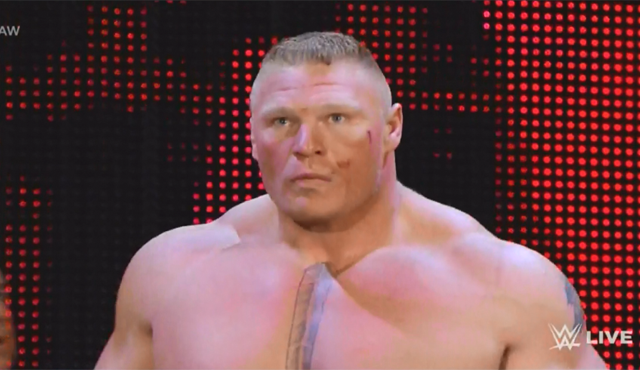wrestling / News
UPDATED: USADA Issues Statement on Brock Lesnar’s Suspension
 Image Credit: WWE
Image Credit: WWE
UPDATE: Here is the US Anti-Doping Agency’s official statement on Brock Lesnar’s one-year suspension for failing two drug tests in relation to his UFC 200 fight against Mark Hunt. As noted previously, Lesnar is able to return to competition on July 15th.
USADA announced today that UFC® athlete, Brock Lesnar, of the Brooklyn Park, M.N., received a one-year sanction, pursuant to the UFC Anti-Doping Policy, after testing positive for a prohibited substance on two occasions.
Lesnar, 39, tested positive for clomiphene and its metabolite, 4-hydroxyclomiphene, following an out-of-competition urine test conducted on June 28, 2016, and an in-competition urine test conducted on July 9, 2016, at UFC 200 in Las Vegas, Nev. Clomiphene is a prohibited substance in the category of Hormone and Metabolic Modulators and is prohibited at all times under the UFC Anti-Doping Policy, which has adopted the WADA Prohibited List.
Lesnar’s one-year period of ineligibility began on July 15, 2016, the date on which he was provisionally suspended by USADA, and is identical in length to the sanction imposed by the Nevada State Athletic Commission (NSAC) on December 15, 2016. In addition, the NSAC overturned Lesnar’s victory at UFC 200 to a no-contest.
Pursuant to the UFC Anti-Doping Policy, all UFC athletes serving a period of ineligibility for an anti-doping policy violation are required to remain in the USADA registered testing pool and make themselves available for testing in order to receive credit for time served under his or her sanction. Furthermore, if an athlete retires during his or her period of ineligibility, the athlete’s sanction will be tolled until such time the athlete notifies USADA of his or her return from retirement and once again makes him or herself available for no-advance-notice, out-of-competition testing.
USADA conducts the year-round, independent anti-doping program for all UFC athletes. USADA is an independent, non-profit, non-governmental agency whose sole mission is to preserve the integrity of competition, inspire true sport, and protect the rights of clean athletes. In an effort to aid UFC athletes, as well as their support team members, in understanding the rules applicable to them, USADA provides comprehensive instruction on the UFC Anti-Doping Program website (www.ufc.usada.org) regarding the testing process and prohibited substances, how to obtain permission to use a necessary medication, and the risks and dangers of taking supplements as well as performance-enhancing and recreational drugs. In addition, the agency manages a drug reference hotline, Drug Reference Online (www.ufc.globaldro.com), conducts educational sessions, and proactively distributes a multitude of educational materials, such as the Prohibited List, easy-reference wallet cards, and periodic athlete alerts.
ORIGINAL: MMAFighting.com reports that the US Anti-Doping Agency (USADA) has handed down WWE Superstar and former UFC heavyweight champion Brock Lesnar a one-year suspension based off of his two failed drug tests for his fight last July at UFC 200. His suspension from MMA competition would end July 15, 2017, which is the period of one year after his provisional USADA suspension originally started.
USADA ruled that Lesnar tested positive for clomiphene and its metabolite, 4-hydroxyclomiphene, for his out-of-competition drug test on June 28. He later failed an in-competition test on fight night for UFC 200, which was July 9. Due to the nature of the drug, one year was the maximum sentence Lesnar could receive under UFC and USADA’s current sanctions.
In addition, Lesnar was handed down a $250,000 and a one-year suspension by the Nevada State Athletic Commission earlier in December. His win over Mark Hunt was overturned to a No Contest. The NSAC reportedly shared jurisdiction in the case with USADA.
Also, any athlete who is currently serving a suspension also has to remain in the USADA drug-testing pool until the ban is over. If there is any type of retirement by the athlete during the suspension, then the ban will be frozen until the fighter potentially comes out of retirement and then re-enters the drug testing pool. It should be noted that Lesnar previously retired from active MMA competition in 2011, before ultimately returning in 2016.
The suspension will not have any affect on Lesnar’s current obligations to WWE, and he’s still scheduled to appear at the Royal Rumble event set for January 29.
More Trending Stories
- Booker T Weighs In On Rhea Ripley’s Injury, Wants Hardy Boys Back In WWE
- Tony Khan Weighs In On Warning From Oklahoma Athletic Commission Over Nyla Rose Match
- Backstage Update on WWE’s Plans for WrestleMania 41, Possible Move to March or May
- Jim Ross Recalls Dustin Rhodes Being Fired From WCW For Not Following No-Blood Policy







